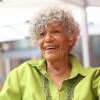Notorious Boston mobster James "Whitey" Bulger, who evaded federal authorities for 16 years and was eventually found guilty of murder, died in prison on Tuesday. The 89-year-old, who led an Irish mob involved in loan-sharking, gambling and the drug trade, was found dead at a U.S. prison in West Virginia where he was serving two consecutive life sentences.
As one of the FBI's "Ten Most Wanted," Bulger and his case captivated the nation. He worked with the bureau for a stretch, informing on a rival gang. He was also the model for Jack Nicholson's character in Martin Scorcese's "The Departed," in 2006. At the age of 81, he was captured in Santa Monica, California with his girlfriend.
WGBH News closely followed Bulger's trial. The links and videos below are the highlights of our coverage.
1. To mark the start of Bulger's trial, Greater Boston created a 40-minute documentary on his criminal record, the people he associated with and his victims. The special, hosted by Emily Rooney, aired in June of 2013.
2. In the 1970s and 1980s, Bulger had a reputation that was both fearsome and simultaneously altruistic. Indeed, he was known in parts of working class South Boston as the “Robin Hood” of the community. Reporter Phillip Martin spent some time running down the many myths swirling around Bulger.
3. Former mobster Kevin Weeks, Bulger's right hand man for more than two decades, went to prison on racketeering and money laundering charges. Emily Rooney interviewed him after he wrote a book about his time with Bulger.
4. Catherine Greig stayed with Bulger for more than 16 years while he was on the run. After Bulger was captured, she pleaded guilty to charges of helping him evade authorities. But her saga wasn't over. Three years after going to prison, Greig faced new charges for allegedly refusing to name who helped her and Bulger stay free.
5. Janet Uhlar, one of the jurors who found Bulger guilty, communicated with him via letters after the trial. She says she believes the infamous mob boss didn’t get a fair trial. “I believe that a lot of things were kept from the jury, and we’re supposed to base our decision on facts and I don’t think we got a lot of the facts,” Uhlar told Jim Braude on Greater Boston.





